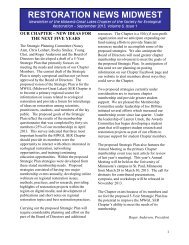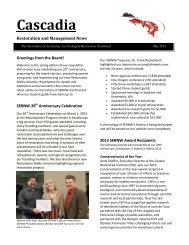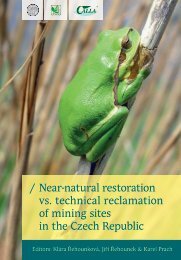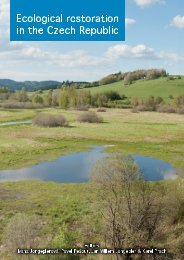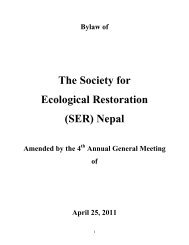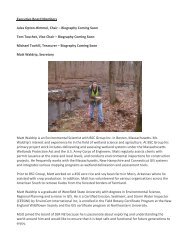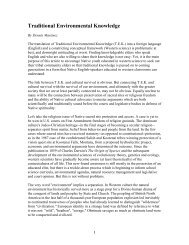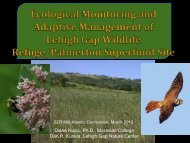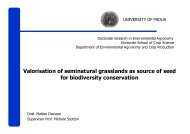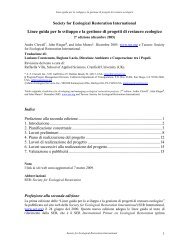THE WORLD CONFERENCE ON ECOLOGICAL RESTORATION
A Global Challenge - Society for Ecological Restoration
A Global Challenge - Society for Ecological Restoration
You also want an ePaper? Increase the reach of your titles
YUMPU automatically turns print PDFs into web optimized ePapers that Google loves.
2005 The World Conference on Ecological Restoration 43<br />
Heidegger and the Paradox of Ecological Restoration<br />
Cameron W.S.K.<br />
Dept of Philosophy, Loyola Marymount University, Los Angeles, CA, USA<br />
Among Heidegger’s most brilliant contributions to environmental philosophy is his devastating critique of<br />
modern science’s fundamental, technological mindset. The stinking rose that is the bloom of our epoch<br />
in the history of being, the experimental method projects and then confirms its view of the world as repeatably<br />
present-at-hand, thereby concealing both its own being and the temporality of Dasein. This theoretical<br />
distortion, moreover, has had powerful practical consequences. Driven by its fundamental orientation<br />
to control, science reveals the world and eventually humanity itself as standing reserve, i.e. as<br />
equipment made for consumption by the human will to power. Worse still, Heidegger’s frightening picture<br />
is undeniably compelling: the last two centuries offer many examples of our achieving tremendous power<br />
only to find that, like the sorcerer’s apprentice, we cannot constrain what we’ve unleashed. Our aspiration<br />
to power has rendered us progressively more powerless. Yet as compelling as this story appears—<br />
and indeed as tempting for environmentalists in the humanities who, denied the economic and political<br />
prestige of their scientist colleagues, can at least indulge in self-righteous condemnation—matters cannot<br />
be so simple. Any blanket condemnation of science generates intractable theoretical and practical problems—a<br />
difficulty not only in general, but for Heidegger in particular as one who sees Dasein’s knowing<br />
and acting as intimately connected. To sketch the general problem in a thumbnail: many environmentalists,<br />
e.g. Holmes Rolston III, praise science as offering essential insights into the beauty, complexity, and<br />
wonder of the natural world. For them, one could not appreciate the environment without any insight<br />
into its unseen depths. But the practical problem with Heidegger’s view is even more pressing for environmentalists,<br />
since by apparently rejecting science, Heidegger leaves little or no justification for developing<br />
the techniques by which environmental mitigation, revegetation, and (more broadly) restoration may<br />
become effective—an enormous problem, given both the environmental degradation that has already occurred<br />
and that which will yet occur under the momentum of current practices. Of the many questions<br />
that could be raised, I will focus on two interpretive ones. First, does Heidegger in fact reject science<br />
completely? And if not, what form could science take once we have conceded and rejected the devastating<br />
consequences of understanding science as Gestell? Addressing this question is difficult, since it is implicitly<br />
an ethical one, and Heidegger’s attitude towards ethics was famously astringent. Yet recent work<br />
clarifying Heidegger’s philosophy of science as well as other work drawing out the ethical implications of<br />
his position have suggested between them new possibilities for rendering his powerful critique of technology<br />
both performatively consistent and practically plausible.<br />
Keywords: Heidegger, restoration as technology and technique, restoration as listening and enabling.<br />
Evaluation of Agro-environment Schemes in England - A Three Pronged<br />
Approach<br />
Carey P.D.<br />
Centre for Ecology and Hydrology, Monks Wood, Abbots Ripton, Huntingdon, Cambridgeshire, PE28 2LS, UK<br />
Since 1997 we have been evaluating two agro-environmental schemes in England, the Countryside Stewardship<br />
Scheme and the Environmentally Sensitive Areas. We have looked at a) targeting of the schemes,<br />
b) the way the scheme is being applied and c) delivery of ecological objectives. Results from each of a, b<br />
and c will be presented and a synthesis of the effectiveness of the schemes will be made. The schemes<br />
appear to have been well targeted, well run and for wet grassland and calcareous grassland have delivered<br />
objectives. However not everything is perfect!. Information on the two new schemes that started in<br />
England in April 2005 will also be presented.<br />
Keywords: Agro-environment, targeting, scheme management, delivery, success.<br />
Comparison of revegetation of roadside slopes using different sowing mixtures<br />
C˘arni A., P. Kos˘ir, U. S˘ilc, I. Zelnik<br />
Institute of Biology, Scientific Research Centre of the Slovenian Academy of Sciences and Arts, Novi trg 2, p. b. 306, SI-1001<br />
Ljubljana<br />
The research took place in the sub-Mediterranean part of Slovenia. Two plant species mixtures were<br />
sown, one with nursing grasses and the other without them, and tested to determine, which one is better<br />
for restoration of roadside slopes. Both sets of plots were sampled every year over a period of six years<br />
and analysed (indirect gradient analyses, species number, similarity, syntaxa). It was found that the mix-



